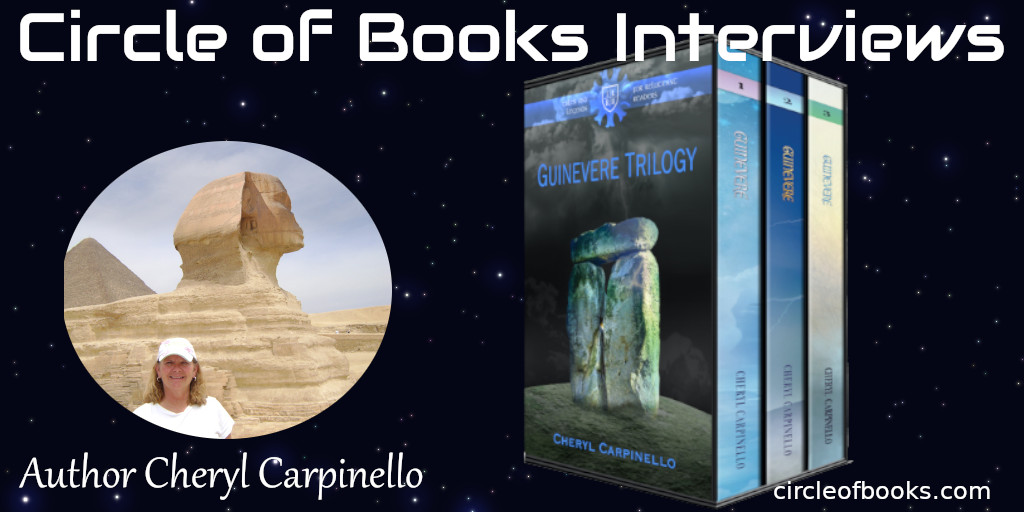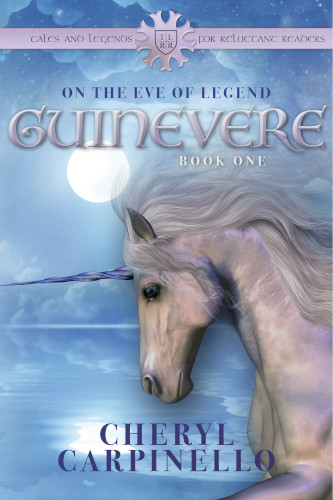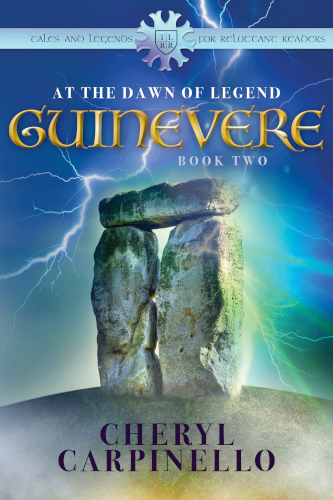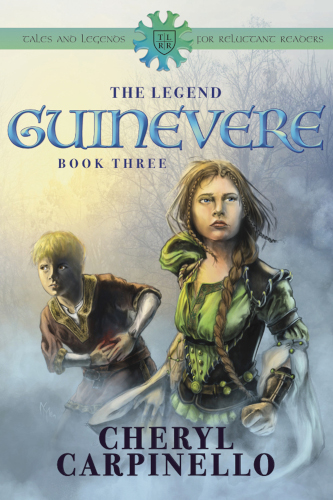Interview – Cheryl Carpinello
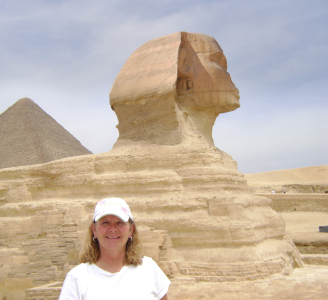
Interview
– What moved you to start writing?
Over my 20+ years of teaching, I encountered so many students who just didn’t like to read. However, when I introduced the tales of King Arthur, I didn’t have a student (I swear it’s the truth!) who didn’t read something from the Legend. A few of my non-readers actually went to the library and found additional stories of King Arthur and the Knights of the Round Table. They also enjoyed reading other stories from the Medieval and Ancient Worlds like The Iliad and The Odyssey, Tales of the Arabian Nights, Beowulf, and The Canterbury Tales. In the hope of encouraging more kids to explore the world of books, I decided that once I retired from teaching, I would write those stories for younger readers. And so, in 2008, I began with a young Guinevere that I felt readers and emerging readers could identify with and would move them into the magical world of books.
– Tell us about your book. Why should everyone buy it?
I write Tales & Legends from the Ancient and Medieval Worlds. My target audience are reluctant/emerging readers, but readers of all ages enjoy venturing into the stories from Arthurian Legend and those ancient tales hold so many untold stories that attract the young-at-heart. I also write Grandma/Grandpa’s Tales 1 & 2 for the very young (ages 2-4) and those just starting to learn to read.
Arthurian Legend never dies and continues to appeal to all generations. My four Arthurian stories are Guinevere: On the Eve of Legend, book 1; Guinevere: At the Dawn of Legend, book 2; Guinevere: The Legend, book 3; and The King’s Ransom (Young Knights of the Round Table). They are an excellent introduction for young readers offering excitement, danger, laugher, and the elements of the Legend that never grow old: loyalty, friendship, courage, heroes, magic, and fantasy. Did you know that Merlyn lives backwards in time? Try and figure that one out!
My Egyptian stories, Tutankhamen Speaks and Sons of the Sphinx, bring to life for readers the world of the pharaohs and their lives. Tutankhamen Speaks looks back into the life of King Tut narrated by Tut himself from beyond the grave. We are shown his childhood, his true love, and the tragedy that exists in all life. Sons of the Sphinx is an exciting but dangerous journey back in time to help the ghost of King Tut find his lost queen and possibly rewrite history. My three-week visit to Egypt allowed me to place my readers in that ancient country with all its mystery and magic as well as the sweltering heat and blistering sun!
Grandma/Grandpa’s Tales 1 contains two read-aloud shorts: Wild Creatures in My Neighborhood and What if I Went to the Circus? Crafted with repeated phrases, kids begin to recognize words and by memorizing those begin to learn to read. The pictures accompanying the stories are big and colorful. Grandma/Grandpa’s Tales 2 have Singers of Songs and The Not Too Stubborn Humpback. Along with the repetition of phrases, several blank pages are included for readers to add their pictures to the stories.
– Tell us a bit about your writing process.
I’m not really an outliner. I do a general storyline, but nothing too elaborate. Long before that though, I do a lot of writing in my head. Sounds a little crazy, but it works for me. When I sit down to actually write, I turn off the critical part of my brain and give my creative side full rein. While I make chapter notes, like characters present, what they’re wearing, and 1 or 2 sentences about what happened, these notes are just reminders so I don’t give someone red hair in one chapter and black in the next! Each day when I sit down to write, I read through the previous session and then start right in from that. I don’t edit until after I’ve finished the entire book so I can keep that critical side away from my story.
– What author would you love to have dinner with?
There are so many! Couldn’t I just have a dinner party?!! I’d have Sophocles, Dostoevsky, Homer, J.R.R. Tolkien, Charles Dickens, Douglas Preston, Lincoln Childs, Elizabeth Peters, and David Baldacci to start. All master storytellers.
– Tell us about your hobbies and passions other than writing.
Love spending time with my family and grandkids and attending college football games with my husband. I’m always reading although somehow there are more books than time! However, my passion is traveling. I’m ready to go anywhere at any time. Traveling around the world is amazing. When we go, we spend around 3 weeks in a country to really take in the sights, experience the culture, and get to know the people. We usually rent a car so we have freedom of movement. It’s so much fun!
– We have many followers who would like to start writing a book or are already writing their first book, any advice for these brave people?
Write what you like to read, what you know, what you love. Do that and ignore those who try to discourage you. Don’t write for money. Write for the love of writing and telling stories. That said, brush up on your writing skills by investing in writing courses. Very few people can sit down and just write a book. Invest in yourself just as you would in any profession by improving your skills. Even after writing eight books (most award winners), I still take writing classes at least once a year. Also, invest in an editor. Friends and family are not qualified to edit your book, and all books need at least one editor that is not you.
– How often do you write, daily, every other day or?
I don’t have a set schedule. I write when I have an opportunity. Sometimes it’s every day, sometimes once or twice a week. However, when I can’t physically write, I develop my story in my head. If you can do this, it eliminates the stress of not being able to actually write.
– How important is it to get your facts right and are there any instances when you bend history to fit your story?
Very important. Nothing will turn a reader off quicker than reading something they know is not correct. In my Arthurian stories, I research the geography and towns mentioned in them as well as other items, such as the cave paintings in France for Guinevere: The Legend. In my Egyptian tales, I blended the factual information with my analysis from several different sources to arrive at various scenarios. This is how I arrived at the title for Sons of the Sphinx.
– What are you reading at the moment?
Left over from my college days, I read several books at the same time. I just finished Impossible Odds by Jessica Buchanan, Erik Landemalm, and Anthony Flacco. I’m re-reading—for the third time—Elizabeth Peters’ Amelia Peabody 20-book mystery series set in Egypt in the late 1800’s/early 1900’s. I’m in the middle of Steven Saylor’s Roma series set in Ancient Rome. Waiting in the wings is Preston & Childs’ City of Endless Night, David Baldacci’s Daylight, and Toby Wilkinson’s A World Beneath the Sands (The Golden Age of Egyptology).
– How is it to be an author in your country? Do you have a good support from the local public?
In the US, I work mainly with schools, craft fairs, and Farmers’ Markets. These are where I can connect directly with my readers. It’s always fun to introduce young readers to my Arthurian Legend. I sell most of my books at these events as my target audience can’t buy online without assistance. My interactions with parents and grandparents at these events has garnered me several young-at-heart readers for my Ancient Egypt tales and my picture books.
– Certainly you have had some interesting episodes as an author, fans related or others, share one of them with us.
I was doing a writing workshop for 4th grade students (ages 9 & 10) at a local elementary school. Students were to write a poem about Medieval times and/or King Arthur. I had given them examples of five different poems to choose from. During this exercise, I walk around and talk with students and see what they’re writing about. I noticed their teacher was hovering over two boys who were laughing but pausing frequently to write. I don’t worry too much about this behavior during my workshops because I’ve found that noise levels increase as they share ideas and particularly if two are working together. These two had asked if they write about Medieval weapons. I had told them that would be acceptable. They chose Excalibur. A few minutes later the teacher came over and pointed to those two boys. You know, he said, those two have never done any writing for me. They are so excited about their poem. Thank you. I just love these moments, both as an educator and as a guest in the classroom. And who knows, maybe they went on to read about Arthur and to even write a short story starring Excalibur.
– A final message for our circleofbooks.com readers.
Reading is a window into our world, past, present, and future. It allows for exploration of ideas, clarification of difficult situations, and an emotional release from every day headaches. Read every day, and if you have children, read to them, with them, and encourage them to read on their own.
Thank you Cheryl Carpinello. We at circleofbooks.com wish you much success!
Click here to visit the author page here on Circle of Books.
Tweet
